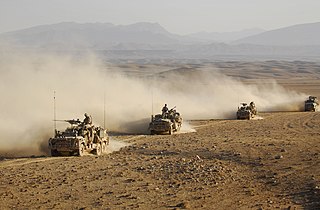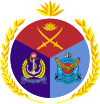
The Directorate General of Forces Intelligence, commonly known by its acronym DGFI, is the defense intelligence agency of the Bangladesh Armed Forces, tasked with collection, collation and evaluation of strategic and topographic information, primarily through human intelligence (HUMINT). As one of the principal members of the Bangladesh intelligence community, the DGFI reports to the Director-General under the executive authority of the head of government, the Prime Minister, and is primarily focused on providing intelligence for the Prime Minister, the Cabinet of Bangladesh, and the Armed Forces of Bangladesh.
The Australian Intelligence Community (AIC) and the National Intelligence Community (NIC) or National Security Community of the Australian Government are the collectives of statutory intelligence agencies, policy departments, and other government agencies concerned with protecting and advancing the national security and national interests of the Commonwealth of Australia. The intelligence and security agencies of the Australian Government have evolved since the Second World War and the Cold War and saw transformation and expansion during the Global War on Terrorism with military deployments in Afghanistan, Iraq and against ISIS in Syria. Key international and national security issues for the Australian Intelligence Community include terrorism and violent extremism, cybersecurity, transnational crime, the rise of China, and Pacific regional security.

The Directorate of Military Intelligence is the military intelligence branch of the Defence Forces, the Irish armed forces, and the national intelligence service of Ireland. The organisation has responsibility for the safety and security of the Irish Defence Forces, its personnel, and supporting the national security of Ireland. The directorate operates domestic and foreign intelligence sections, providing intelligence to the Government of Ireland concerning threats to the security of the state and the national interest from internal and external sources.

The special forces of the Australian Defence Force are units of Special Operations Command and associated units of the Royal Australian Navy and the Royal Australian Air Force that conduct and or support special operations to advance and protect the national security of the Commonwealth of Australia. The special forces of Australia have a lineage to a variety of units raised in the Second World War such as the Independent and Commando Companies, Z Special Unit, Navy Beach Commandos, and the Coastwatchers. Australian special forces have most recently been deployed to Iraq in Operation Okra as the Special Operations Task Group, as the Special Operations Task Group in Afghanistan, in Afghanistan in support of the Australian Secret Intelligence Service and regularly for counter-terrorism pre-deploy to locations of major domestic events throughout Australia in readiness to support law enforcement such as the 2014 G20 Brisbane summit.
The Special Detective Unit (SDU) is the main domestic security agency of the Garda Síochána, the national police force of Ireland, under the aegis of the Crime & Security Branch (CSB). It is the primary counter-terrorism and counter-espionage investigative unit within the state. The Special Detective Unit superseded the Special Branch, which itself replaced the older Criminal Investigation Department (CID), which was founded in 1921. They work in conjunction with the Defence Forces Directorate of Military Intelligence (J2) – Ireland's national intelligence service – on internal matters. The unit's headquarters are in Harcourt Street, Dublin City.
The counter-terrorism page primarily deals with special police or military organizations that carry out arrest or direct combat with terrorists. This page deals with the other aspects of counter-terrorism:

The Directorate General of National Security Intelligence, commonly known as the NSI, is the principal civilian intelligence agency of the People's Republic of Bangladesh. The NSI's headquarters is in 1 Segunbagicha, Dhaka, Bangladesh. The NSI is the leading body of the Government of Bangladesh in the field of internal security, counter terrorism, counter intelligence and foreign intelligence. NSI is the largest among the intelligence agencies in Bangladesh, the others being the Directorate General of Forces Intelligence (DGFI), SB, CID, PBI and intelligence directorates of armed and paramilitary forces. The agency stands under the direct authority of the Prime Minister of Bangladesh.
The Bangladesh Intelligence Community is a group of several intelligence agencies charged with carrying out intelligence-gathering activities considered necessary for the conduct of foreign relations and national security of Bangladesh including other functions vital for the national security of Bangladesh. Member organizations of the Bangladesh intelligence community include military intelligence of Bangladesh Army, Navy, Air Force, National Police and civilian intelligence and analysis offices within executive ministries. The I.C. is headed by a Director heading each Intelligence agency, who reports to the Prime Minister of the Bangladesh.The organisation and structure of the modern Bangladesh intelligence community has developed its structures from agencies that continued to function after Independence from Pakistan. Bangladesh intelligence agencies today are the National Security Intelligence, the Special Branch, Army Intelligence, Air Force Intelligence, Naval Intelligence and the Directorate General of Forces Intelligence (DGFI). During the 1971 Bangladesh Independence War, the Bangladesh Forces in the 11 BDF Sectors also developed an intelligence network within its organisation of guerrilla combat teams that provided the sectors with essential local intelligence. However, the intelligence agency personnel have been and still continues to be recruited and trained from within the particular agency. Among their varied responsibilities, the members of the Community collect and produce foreign and domestic intelligence, contribute to military planning, and perform espionage.
The Directorate General of Forces Intelligence, commonly known as DGFI is the military intelligence section of the Bangladesh Armed Forces, tasked with collection, collation, and evaluation of strategic and topographic information, primarily through human intelligence (HUMINT). As one of the principal members of the Bangladeshi intelligence community, the DGFI reports to the Director-General and is primarily focused on providing intelligence for the Prime Minister, the Cabinet of Bangladesh, and the Armed Forces of Bangladesh.
Sadik Hasan Rumi is a former Major General of Bangladesh Army who served as Director General of Directorate General of Forces Intelligence (DGFI) from May 2002 to May 2007.
ATM Amin is a retired General of the Bangladesh Army. He is a former Director General of Forces Intelligence, and a former Director General of Ansar and VDP. He was forced into retirement in 2009.

Molla Fazle Akbar was a three-star rank Bangladesh Army officer. A Lieutenant General and the former Director General of Directorate General of Forces Intelligence. After retirement he served as the Chief advisor of Regent Airways, Bangladesh operating in domestic and international routes and the chairman of the board of directors of a financial institute, Bangladesh Industrial Finance Company Limited (BIFC) as well as Vice Chairman of the board of directors of a commercial Bank, Union Bank Limited.
S M Matiur Rahman OSP (BAR), SUP, afwc, psc, is a retired three-star-rank Bangladesh Army officer, a lieutenant general. He was general officer commanding, Army Training and Doctrine Command, Mymensingh Cantonment. Prior to join ARTDOC, he was GOC of 24 Infantry Division and area commander of Chattogram area. Earlier, he was adjutant general of the Bangladesh Army. He was also vice chairman of Trust Bank's board of directors. He served as general officer commanding (GOC) of 55 Infantry Division & Area Commander of Jessore Area. He also served as the director of Counter-Terrorism Intelligence Bureau (CTIB) of Directorate General of Forces Intelligence. He served as commander of 46th Independent Infantry Brigade. He also served as additional director general (operations) of the Rapid Action Battalion.

The Government agencies in Bangladesh are state controlled organizations that act independently to carry out the policies of the Government of Bangladesh. The Government Ministries are relatively small and merely policy-making organizations, allowed to control agencies by policy decisions. Some of the work of the government is carried out through state enterprises or limited companies.
Kabir Ahmed is a Major General of Bangladesh Army and Military Secretary to Prime Minister of Bangladesh, Sheikh Hasina since March, 2022. Prior to join Prime Minister's office, he was posted at Directorate General of Forces Intelligence. He elevated to the rank of Major General on 20 July 2022.
Aynaghar or House of Horror is the name of a secret detention centre run by the Directorate General of Forces Intelligence (DGFI), Bangladesh's defence forces' intelligence branch.
Golam Mohammad was a Major General of Bangladesh Army and former Director General of the Directorate General of Forces Intelligence. He is the former the Director General of Bangladesh Institute of International and Strategic Studies.







